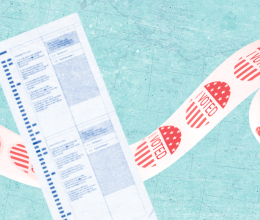UPDATE: Ohio Voters Gain Greater Access to Ballot in ACLU Settlement
COLUMBUS, OH – The American Civil Liberties Union (ACLU) today filed a lawsuit asking a federal court to strike down a new state law and a directive from Ohio Secretary of State Jon Husted that have slashed early voting opportunities in Ohio in advance of the 2014 election.
The ACLU and the ACLU of Ohio brought the complaint on behalf of the Ohio Conference of the National Association for the Advancement of Colored People (NAACP), the League of Women Voters of Ohio and several African-American churches.
"Ohio has again taken center stage in the battle over voting rights," said Dale Ho, director of the ACLU's Voting Rights Project. "Politicians who tamper with people's fundamental right to vote are being put on notice that they are not going to get away with it.”
The lawsuit names Husted and Ohio Attorney General Mike DeWine as defendants. It seeks to strike down Ohio Senate Bill 238, a 2014 law that eliminated the first week of early voting in Ohio. This period, often referred to as "Golden Week," enables voters to register and cast a ballot on the same day. The suit is also challenging a 2014 Husted directive that further slashed the early voting period by eliminating all Sundays, the Monday before Election Day and all evening voting hours.
"Together these cuts will impact tens of thousands of low-income voters, elderly voters, student voters and African-American voters who turn to early in-person voting as their best option for casting a ballot," said Sybil Edwards-McNabb, president of the Ohio Conference of the NAACP.
In the 2012 election, more than 157,000 Ohioans voted on the days that have now been cut. A disproportionately high percentage of those are low-income voters, many of whom are also African American. Lower-income voters tend to rely on evening and Sunday voting because they cannot take paid time off of work to vote during regular business hours. Single parents need these hours because it’s the only time they can find friends or family who can provide child care. People experiencing homelessness or severe transience rely on the opportunity to register and vote at the same time during the first week of early voting. And among many within the African-American church community, Sunday voting has become an important cultural tradition.
"These cuts will destroy the 'Souls to the Polls' programs many churches have created to transport parishioners to the polls on the Sunday before Election Day," said Reverend Dale Snyder of Bethel African Methodist Episcopal Church in Columbus.
In Ohio, targeting early voting has become a pattern. In 2011, the Ohio General Assembly passed a law eliminating both Golden Week and the last three days of early voting before Election Day. Voters responded by organizing a ballot referendum to strike down the law, prompting legislators to repeal it on their own.
In 2012, Husted continued the pattern by issuing a directive that cut the same three days of early voting for all non-military voters. The Obama campaign responded with a federal lawsuit and the court forced Husted to restore the early voting days, allowing an additional 67,000 voters to cast an in-person ballot before the election.
"The people of Ohio organized a referendum expressly to stop these kinds of attacks on early voting and a federal judge has already intervened once for the same purpose," said Carrie Davis, executive director of the League of Women Voters of Ohio. "Now the same politicians are back with the same bad ideas. Meanwhile, good ideas like online voter registration languish in political limbo. These are the ideas we need to be working on."
The complaint, NAACP v. Husted, was filed in the U.S. District Court for the Southern District of Ohio, Eastern Division.





